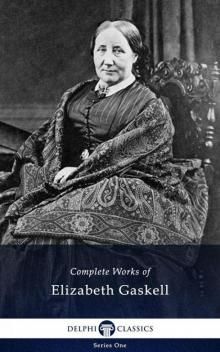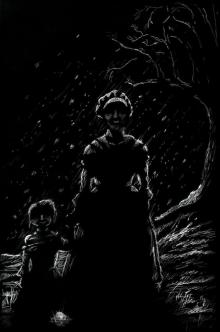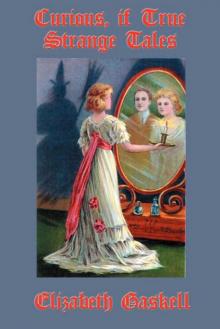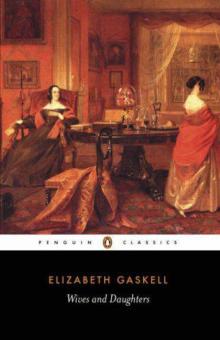- Home
- Elizabeth Gaskell
Cranford Page 3
Cranford Read online
Page 3
‘But, to be sure, what a town Cranford is for kindness! I don’t suppose any one has a better dinner than usual cooked, but the best part of all comes in a little covered basin for my sister. The poor people will leave their earliest vegetables at our door for her. They speak short and gruff, as if they were ashamed of it; but I am sure it often goes to my heart to see their thoughtfulness.’ The tears now came back and overflowed; but after a minute or two, she began to scold herself, and ended by going away, the same cheerful Miss Jessie as ever.
‘But why does not this Lord Mauleverer do something for the man who saved his life?’ said I.
‘Why, you see, unless Captain Brown has some reason for it, he never speaks about being poor; and he walked along by his lordship, looking as happy and cheerful as a prince; and as they never called attention to their dinner by apologies, and as Miss Brown was better that day, and all seemed bright, I dare say his lordship never knew how much care there was in the background. He did send game in the winter pretty often, but now he is gone abroad.’
I had often occasion to notice the use that was made of fragments and small opportunities in Cranford; the rose-leaves that were gathered ere they fell, to make into a pot-pourri for some one who had no garden; the little bundles of lavender-flowers sent to strew the drawers of some town-dweller, or to burn in the chamber of some invalid. Things that many would despise, and actions which it seemed scarcely worth while to perform, were all attended to in Cranford. Miss Jenkyns stuck an apple full of cloves, to be heated and smell pleasantly in Miss Brown’s room; and as she put in each clove, she uttered a Johnsonian sentence. Indeed, she never could think of the Browns without talking Johnson; and, as they were seldom absent from her thoughts just then, I heard many a rolling three-piled sentence.
Captain Brown called one day to thank Miss Jenkyns for many little kindnesses, which I did not know until then that she had rendered. He had suddenly become like an old man; his deep bass voice had a quavering in it; his eyes looked dim, and the lines on his face were deep. He did not – could not – speak cheerfully of his daughter’s state, but he talked with manly pious resignation, and not much. Twice over he said, ‘What Jessie has been to us, God only knows!’ and after the second time, he got up hastily, shook hands all round without speaking, and left the room.
That afternoon we perceived little groups in the street, all listening with faces aghast to some tale or other. Miss Jenkyns wondered what could be the matter, for some time before she took the undignified step of sending Jenny out to inquire.
Jenny came back with a white face of terror. ‘Oh, ma’am! oh, Miss Jenkyns, ma’am! Captain Brown is killed by them nasty cruel railroads!’ and she burst into tears. She, along with many others, had experienced the poor Captain’s kindness.
‘How? – where – where? Good God! Jenny, don’t waste time in crying, but tell us something.’ Miss Matty rushed out into the street at once, and collared the man who was telling the tale.
‘Come in – come to my sister at once, – Miss Jenkyns, the rector’s daughter. Oh, man, man! say it is not true,’ – she cried, as she brought the affrighted carter, sleeking down his hair, into the drawing-room, where he stood with his wet boots on the new carpet, and no one regarded it.
‘Please mum, it is true. I seed it myself,’ and he shuddered at the recollection. The Captain was a-reading some new book as he was deep in, a-waiting for the down train; and there was a little lass as wanted to come to it’s mammy, and gave it’s sister the slip, and came toddling across the line. And he looked up sudden, at the sound of the train coming, and seed the child, and he darted on the line and cotched it up, and his foot slipped, and the train came over him in no time. Oh Lord, Lord! Mum, it’s quite true – and they’ve come over to tell his daughters. The child’s safe, though, with only a bang on its shoulder, as he threw it to its mammy. Poor Captain would be glad of that, mum, wouldn’t he? God bless him!’ The great rough carter puckered up his manly face, and turned away to hide his tears. I turned to Miss Jenkyns. She looked very ill, as if she were going to faint, and signed to me to open the window.
‘Matilda, bring me my bonnet. I must go to those girls. God pardon me, if ever I have spoken contemptuously to the Captain!’
Miss Jenkyns arrayed herself to go out, telling Miss Matilda to give the man a glass of wine. While she was away, Miss Matty and I huddled over the fire, talking in a low and awestruck voice. I know we cried quietly all the time.
Miss Jenkyns came home in a silent mood, and we durst not ask her many questions. She told us that Miss Jessie had fainted, and that she and Miss Pole had had some difficulty in bringing her round: but that, as soon as she recovered, she begged one of them to go and sit with her sister.
‘Mr Hoggins says she cannot live many days, and she shall be spared this shock,’ said Miss Jessie, shivering with feelings to which she dared not give way.
‘But how can you manage, my dear?’ asked Miss Jenkyns; ‘you cannot bear up, she must see your tears.’
‘God will help me – I will not give way – she was asleep when the news came; she may be asleep yet. She would be so utterly miserable, not merely at my father’s death, but to think of what would become of me; she is so good to me.’ She looked up earnestly in their faces with her soft true eyes, and Miss Pole told Miss Jenkyns afterwards she could hardly bear it, knowing, as she did, how Miss Brown treated her sister.
However, it was settled according to Miss Jessie’s wish. Miss Brown was to be told her father had been summoned to take a short journey on railway business. They had managed it in some way – Miss Jenkyns could not exactly say how. Miss Pole was to stop with Miss Jessie. Mrs Jamieson had sent to inquire. And this was all we heard that night; and a sorrowful night it was. The next day a full account of the fatal accident was in the county paper, which Miss Jenkyns took in. Her eyes were very weak, she said, and she asked me to read it. When I came to the ‘gallant gentleman was deeply engaged in the perusal of a number of Pickwick, which he had just received,’ Miss Jenkyns shook her head long and solemnly, and then sighed out, ‘Poor, dear, infatuated man!’
The corpse was to be taken from the station to the parish church, there to be interred. Miss Jessie had set her heart on following it to the grave; and no dissuasives could alter her resolve. Her restraint upon herself made her almost obstinate; she resisted all Miss Pole’s entreaties, and Miss Jenkyns’s advice. At last Miss Jenkyns gave up the point; and after a silence, which I feared portended some deep displeasure against Miss Jessie, Miss Jenkyns said she should accompany the latter to the funeral.
‘It is not fit for you to go alone. It would be against both propriety and humanity were I to allow it.’
Miss Jessie seemed as if she did not half like this arrangement; but her obstinacy if she had any, had been exhausted in her determination to go to the interment. She longed, poor thing! I have no doubt, to cry alone over the grave of the dear father to whom she had been all in all: and to give way, for one little half-hour, un interrupted by sympathy, and unobserved by friendship. But it was not to be. That afternoon Miss Jenkyns sent out for a yard of black crape, and employed herself busily in trimming the little black silk bonnet I have spoken about. When it was finished she put it on and looked at us for approbation – admiration she despised. I was full of sorrow, but, by one of those whimsical thoughts which come unbidden into our heads, in times of deepest grief, I no sooner saw the bonnet than I was reminded of a helmet; and in that hybrid bonnet, half-helmet, half-jockey cap, did Miss Jenkyns attend Captain Brown’s funeral; and, I believe, supported Miss Jessie with a tender indulgent firmness which was invaluable, allowing her to weep her passionate fill before they left.
Miss Pole, Miss Matty, and I, meanwhile, attended to Miss Brown: and hard work we found it to relieve her querulous and never-ending complaints. But if we were so weary and dispirited, what must Miss Jessie have been! Yet she came back almost calm, as if she had gained a new strength. She put off her mourning dre
ss, and came in, looking pale and gentle; thanking us each with a soft pressure of the hand. She could even smile – a faint, sweet, wintry smile – as if to reassure us of her power to endure; but her look made our eyes fill suddenly with tears, more than if she had cried outright.
It was settled that Miss Pole was to remain with her all the watching livelong night; and that Miss Matty and I were to return in the morning to relieve them and give Miss Jessie the opportunity for a few hours of sleep. But when the morning came, Miss Jenkyns appeared at the breakfast table, equipped in her helmet bonnet, and ordered Miss Matty to stay at home, as she meant to go and help to nurse. She was evidently in a state of great friendly excitement, which she showed by eating her breakfast standing, and scolding the household all round.
No nursing – no energetic strong-minded woman could help Miss Brown now. There was that in the room as we entered, which was stronger than us all, and made us shrink into solemn awestruck helplessness. Miss Brown was dying. We hardly knew her voice, it was so devoid of the complaining tone we had always associated with it. Miss Jessie told me afterwards that it, and her face too, were just what they had been formerly, when her mother’s death left her the young anxious head of the family, of whom only Miss Jessie survived.
She was conscious of her sister’s presence, though not, I think, of ours. We stood a little behind the curtain: Miss Jessie knelt with her face near her sister’s, in order to catch the last soft awful whispers.
‘Oh, Jessie! Jessie! How selfish I have been! God forgive me for letting you sacrifice yourself for me as you did. I have so loved you – and yet I have thought only of myself. God forgive me!’
‘Hush, love! hush!’ said Miss Jessie, sobbing.
‘And my father! my dear, dear father! I will not complain now, if God will give me strength to be patient. But, oh, Jessie! tell my father how I longed and yearned to see him at last, and to ask his forgiveness. He can never know how I loved him – oh! if I might but tell him, before I die! What a life of sorrow his has been, and I have done so little to cheer him!’
A light came into Miss Jessie’s face. ‘Would it comfort you, dearest, to think that he does know – would it comfort you, love, to know that his cares, his sorrows –’ Her voice quivered, but she steadied it into calmness, – ‘Mary! he has gone before you to the place where the weary are at rest. He knows now how you loved him.’
A strange look, which was not distress, came over Miss Brown’s face. She did not speak for some time, but then we saw her lips form the words, rather than heard the sound – ‘Father, mother, Harry, Archy;’ – then, as if it was a new idea throwing a filmy shadow over her darkened mind – ‘But you will be alone – Jessie!’
Miss Jessie had been feeling this all during the silence, I think; for the tears rolled down her cheeks like rain, at these words; and she could not answer at first. Then she put her hands together tight, and lifted them up, and said, – but not to us –
‘Though He slay me, yet will I trust in Him.’
In a few moments more, Miss Brown lay calm and still; never to sorrow or murmur more.
After this second funeral, Miss Jenkyns insisted that Miss Jessie should come to stay with her, rather than go back to the desolate house; which, in fact, we learned from Miss Jessie, must now be given up, as she had not wherewithal to maintain it. She had something above twenty pounds a-year, besides the interest of the money for which the furniture would sell; but she could not live upon that: and so we talked over her qualifications for earning money.
‘I can sew neatly,’ said she, ‘and I like nursing. I think, too, I could manage a house, if any one would try me as housekeper; or I would go into a shop, as saleswoman, if they would have patience with me at first.’
Miss Jenkyns declared, in an angry voice, that she should do no such thing; and talked to herself about ‘some people having no idea of their rank as a captain’s daughter,’ nearly an hour afterwards, when she brought Miss Jessie up a basin of delicately-made arrowroot, and stood over her like a dragoon until the last spoonful was finished: then she disappeared. Miss Jessie began to tell me some more of the plans which had suggested themselves to her, and insensibly fell into talking of the days that were past and gone, and interested me so much, I neither knew nor heeded how time passed. We were both startled when Miss Jenkyns reappeared, and caught us crying. I was afraid lest she would be displeased, as she often said that crying hindered digestion, and I knew she wanted Miss Jessie to get strong; but, instead, she looked queer and excited, and fidgeted round us without saying anything. At last she spoke.
‘I have been so much startled – no, I’ve not been at all startled – don’t mind me, my dear Miss Jessie – I’ve been very much surprised – in fact, I’ve had a caller, whom you knew once, my dear Miss Jessie –’
Miss Jessie went very white, then flushed scarlet, and looked eagerly at Miss Jenkyns.
‘A gentleman, my dear, who wants to know if you would see him.’
‘Is it? – it is not –’ stammered out Miss Jessie – and got no farther.
‘This is his card,’ said Miss Jenkyns, giving it to Miss Jessie; and while her head was bent over it, Miss Jenkyns went through a series of winks and odd faces to me, and formed her lips into a long sentence, of which, of course, I could not understand a word.
‘May he come up?’ asked Miss Jenkyns at last.
‘Oh, yes! certainly!’ said Miss Jessie, as much as to say, this is your house, you may show any visitor where you like. She took up some knitting of Miss Matty’s and began to be very busy, though I could see how she trembled all over.
Miss Jenkyns rang the bell and told the servant who answered it to show Major Gordon up-stairs; and presently in walked a tall, fine, frank-looking man of forty, or upwards. He shook hands with Miss Jessie; but he could not see her eyes, she kept them so fixed on the ground. Miss Jenkyns asked me if I would come and help her to tie up the preserves in the store-room; and, though Miss Jessie plucked at my gown, and even looked up at me with begging eye, I durst not refuse to go where Miss Jenkyns asked. Instead of tying up preserves in the store-room, however, we went to talk in the dining-room; and there Miss Jenkyns told me what Major Gordon had told her; – how he had served in the same regiment with Captain Brown, and had become acquainted with Miss Jessie, then a sweet-looking, blooming girl of eighteen; how the acquaintance had grown into love, on his part, though it had been some years before he had spoken; how, on becoming possessed through the will of an uncle, of a good estate in Scotland, he had offered, and been refused, though with so much agitation, and evident distress, that he was sure she was not indifferent to him; and how he had discovered that the obstacle was the fell disease which was, even then, too surely threatening her sister. She had mentioned that the surgeons foretold intense suffering; and there was no one but herself to nurse her poor Mary, or cheer and comfort her father during the time of illness. They had had long discussions; and, on her refusal to pledge herself to him as his wife, when all should be over, he had grown angry, and broken off entirely, and gone abroad, believing that she was a cold-hearted person, whom he would do well to forget. He had been travelling in the East, and was on his return home when, at Rome, he saw the account of Captain Brown’s death in Galignani.
Just then Miss Matty, who had been out all the morning, and had only lately returned to the house, burst in with a face of dismay and outraged propriety:
‘Oh, goodness me!’ she said. ‘Deborah, there’s a gentleman sitting in the drawing-room, with his arm round Miss Jessie’s waist!’ Miss Matty’s eyes looked large with terror.
Miss Jenkyns snubbed her down in an instant:
‘The most proper place in the world for his arm to be in. Go away, Matilda, and mind your own business.’ This from her sister, who had hitherto been a model of feminine decorum, was a blow for poor Miss Matty, and with a double shock she left the room.
The last time I ever saw poor Miss Jenkyns was many years after this. Mrs Gordon h
ad kept up a warm and affectionate intercourse with all at Cranford. Miss Jenkyns, Miss Matty, and Miss Pole had all been to visit her, and returned with wonderful accounts of her house, her husband, her dress, and her looks. For, with happiness, something of her early bloom returned; she had been a year or two younger than we had taken her for. Her eyes were always lovely, and, as Mrs Gordon, her dimples were not out of place. At the time to which I have referred, when I last saw Miss Jenkyns, that lady was old and feeble, and had lost something of her strong mind. Little Flora Gordon was staying with the Misses Jenkyns, and when I came in she was reading aloud to Miss Jenkyns, who lay feeble and changed on the sofa. Flora put down the Rambler when I came in.
‘Ah!’ said Miss Jenkyns, ‘you find me changed, my dear. I can’t see as I used to do. If Flora were not here to read to me, I hardly know how I should get through the day. Did you ever read the Rambler? It’s a wonderful book – wonderful! and the most improving reading for Flora’ – (which I dare say it would have been, if she could have read half the words without spelling, and could have understood the meaning of a third) – ‘better than that strange old book, with the queer name, poor Captain Brown was killed for reading – that book by Mr Boz, you know – “Old Poz;” when I was a girl – but that’s a long time ago – I acted Lucy in “Old Poz.”’ – She babbled on long enough for Flora to get a good long spell at the Christmas Carol, which Miss Matty had left on the table.
III
A Love Affair of Long Ago
I thought that probably my connexion with Cranford would cease after Miss Jenkyns’s death; at least, that it would have to be kept up by correspondence, which bears much the same relationship to personal intercourse that the books of dried plants I sometimes see (‘Hortus Siccus’, I think they call the thing) do to the living and fresh flowers in the lanes and meadows. I was pleasantly surprised, therefore, by receiving a letter from Miss Pole (who had always come in for a supplementary week, after my annual visit to Miss Jenkyns) proposing that I should go and stay with her; and then, in a couple of days after my acceptance, came a note from Miss Matty, in which, in a rather circuitous and very humble manner, she told me how much pleasure I should confer, if I could spend a week or two with her, either before or after I had been at Miss Pole’s; ‘for,’ she said, ‘since my dear sister’s death, I am well aware I have no attractions to offer; it is only to the kindness of my friends that I can owe their company.’

 Lizzie Leigh
Lizzie Leigh The Poor Clare
The Poor Clare Lois the Witch
Lois the Witch North and South
North and South Sexton's Hero
Sexton's Hero My Lady Ludlow
My Lady Ludlow Uncle Peter
Uncle Peter Sylvia's Lovers Elizabeth Cleghorn Gaskell
Sylvia's Lovers Elizabeth Cleghorn Gaskell Delphi Complete Works of Elizabeth Gaskell
Delphi Complete Works of Elizabeth Gaskell The Grey Woman
The Grey Woman The Old Nurse's Story and Other Tales
The Old Nurse's Story and Other Tales Cranford
Cranford Gothic Tales
Gothic Tales Some Passages From the History of the Chomley Family
Some Passages From the History of the Chomley Family An Accursed Race
An Accursed Race Curious, if True: Strange Tales Elizabeth Cleghorn Gaskell
Curious, if True: Strange Tales Elizabeth Cleghorn Gaskell Wives and Daughters
Wives and Daughters The life of Charlotte Brontë
The life of Charlotte Brontë